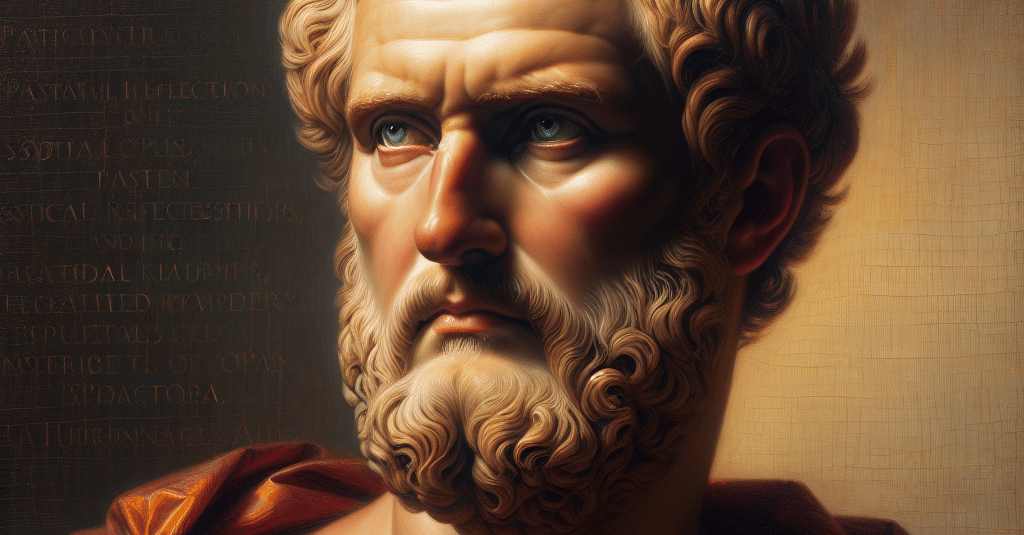10 Timeless Lessons from Marcus Aurelius's Personal Life
Marcus Aurelius, the Roman Emperor and Stoic philosopher, led a life rich with experiences that offer valuable insights for modern living. This article explores the key lessons we can learn from Marcus Aurelius's personal life, providing wisdom that remains relevant centuries later.
STOICISM
8/1/20242 min read
1. Embrace Continuous Learning
Marcus's Approach:
Studied under various philosophers throughout his life
Constantly sought to improve his understanding of the world
Modern Application:
Adopt a lifelong learning mindset
Seek knowledge from diverse sources, regardless of your status or age
2. Practice Daily Gratitude
Marcus's Habit:
Began "Meditations" by expressing gratitude for positive influences in his life
Regularly reflected on the good, even during challenging times
Today's Takeaway:
Implement a daily gratitude practice
Recognize and appreciate the positive aspects of your life, especially during difficulties
3. Lead by Example
Marcus's Leadership:
Strived to live according to Stoic principles, even as emperor
Known for modesty and commitment to duty
Lesson for Today:
Align your actions with your values
Understand that true leadership comes from embodying the principles you espouse
4. Maintain Perspective in Adversity
Marcus's Challenges:
Ruled during times of war, plague, and personal loss
Applied Stoic principles to maintain equanimity
Modern Relevance:
Develop mental resilience for life's challenges
View obstacles as opportunities for growth and learning
5. Balance Duty and Personal Life
Marcus's Struggle:
Juggled roles as emperor, philosopher, husband, and father
Strived for balance while fulfilling responsibilities
Application Today:
Seek work-life balance
Recognize that perfect balance is challenging but worth pursuing
6. Embrace Simplicity
Marcus's Lifestyle:
Lived relatively simply despite imperial status
Valued inner richness over external displays of wealth
Lesson for Modern Times:
Focus on what truly matters rather than material possessions
Find contentment in simplicity and inner growth
7. Practice Self-Reflection
Marcus's Method:
Wrote "Meditations" as a personal journal for self-improvement
Regularly examined his thoughts and actions
Today's Application:
Engage in regular self-reflection
Use journaling or meditation to examine your thoughts and behaviors
8. Accept What You Cannot Control
Marcus's Philosophy:
Faced numerous events beyond his control
Practiced accepting external events while focusing on his own thoughts and actions
Modern Lesson:
Differentiate between what you can and cannot control in your life
Focus your energy on influencing what's within your power
9. Value Time
Marcus's Perspective:
Often reflected on the brevity of life
Emphasized making the most of the time we have
Takeaway for Today:
Prioritize how you spend your time and energy
Live with a sense of purpose, recognizing life's finite nature
10. Strive for Ethical Consistency
Marcus's Dilemma:
Faced ethical challenges as an emperor
Struggled to align actions with philosophical ideals
Modern Application:
Recognize that ethical living can be challenging but is worth pursuing
Strive for consistency between your beliefs and actions
Conclusion: Ancient Wisdom for Modern Living
Marcus Aurelius's personal life offers a wealth of lessons that transcend time. His experiences as a ruler, philosopher, and human being provide invaluable insights for navigating the complexities of modern life. By embracing these lessons – from continuous learning and gratitude to ethical living and self-reflection – we can cultivate a more resilient, purposeful, and fulfilling existence.
The enduring relevance of Marcus Aurelius's life reminds us that true wisdom lies not just in knowledge, but in how we apply that knowledge to our daily lives and challenges. As we face the uncertainties and pressures of the 21st century, the example set by this ancient Roman emperor continues to offer guidance and inspiration.
By incorporating these timeless lessons into our lives, we can aspire to live with greater wisdom, resilience, and purpose – much like Marcus Aurelius himself strived to do nearly two millennia ago.


Waste no more time arguing about what a good man should be. Be one - Marcus Aurelius
We suffer more often in imagination than in reality - Seneca
Wealth consists not in having great possessions, but in having few wants - Epictetus
